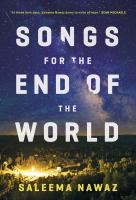Songs for the End of the World by Saleema Nawaz
If I had to guess, I’d say that most people are a bit tired of hearing about the pandemic and dearly wish they could be thinking about other things. Yet there is something cathartic about reading a novel about a pandemic during a pandemic. Frankly, I couldn’t put this book down.
The story begins with Elliott, a New York City police officer who learns that he unwittingly attended a restaurant the night it became ground zero for the spread of a new pandemic in the U.S. Elliott contacts public health and enters into a 21-day quarantine inside his small apartment. He orders a treadmill to keep fit. Groceries are delivered. Elliott spends three weeks watching from his window as the bustling streets of New York become less and less populated, and a new coronavirus dubbed “Aramis” spreads across the globe.
Meanwhile, Owen, a novelist who has written a book about a pandemic, becomes a sought-after expert on the crisis. He is one of the first to refuse in-person interviews and appears only through Skype, knowing that the worst thing you can do in a pandemic is be around people.
Then there is Edith, a hostess at the restaurant where the pandemic exploded. When a doctor at public health releases her photo to the media as a “person of interest”, she quickly becomes known as Aramis Girl, reviled around the world as a vessel of disease.
There are many other characters as well, each of whom must decide how they will deal with a slowly unfolding disaster.
Author Saleema Nawaz researched and wrote Songs for the End of the World between 2013 and 2019. Yet the story is absolutely eerie in its similarities to our current state of affairs. But let’s face it – a pandemic has long been predicted by health authorities. It just so happens that the publication of this book coincided with a real pandemic.
This book had moments that brought me to tears, like the heart-wrenching drama of a teenage boy who must watch his mother dying in the hospital. But it also has moments of hope, like the scene in New York City where “[e]veryone was carrying on, living their lives with a persistence that was at once extraordinary and completely typical.” (p.410) The characters in Nawaz’s novel have the strength to carry on, which is perhaps the best we can hope for.
Christine McCrea is a librarian at Richmond Public Library.


